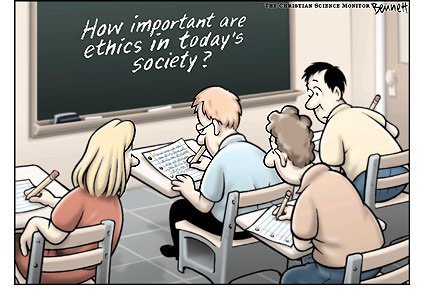The Ethics of Cheating

March 28, 2017
Homework sucks. It’s a fact of life. It’s a certainty, along with death and taxes. It takes too much time and requires too much effort. It detracts from one’s social life, and ultimately causes much more grief than it should. Many of us have sports practice, band practice (nerds), dates to catch up with friends, and phones that long for our attention. Homework sits below a litany of responsibilities we have to worry about. We forget about it, don’t have enough time (or motivation), procrastinate until it’s too late, or simply don’t think it’s worth our time. So we cheat. Maybe that’s not the word you would use; maybe it sounds too dirty for your taste; maybe you just copied one or two problems from your friend’s homework. Maybe it wasn’t a big deal.
Maybe you didn’t study for the big test you have in math. You were busy at sports practice and went home and took a shower and went to bed (after playing on your phone) and couldn’t possibly be bothered to look over your notes. You get to school the next day, realize you have a super big important test that could wreck or save your grade, and resign yourself to failing the course, dropping out of high school, never going to college, working at McDonalds for the rest of your life and living in a cardboard box because your parents have disowned you. But, your godsend of a friend has angled her paper so you can clearly see her answers. You won’t have to live in a cardboard box after all. You subtly peer at her test and transfer the work to yours. You think nothing of it because school has taught you to value grades and performance before ethics and honesty.
You might get away with it. Your teacher doesn’t notice that your test is an exact copy of your friend’s, and you pass the test with flying colors. You think, hey that was pretty easy. So the next time you have a math test, you feel invincible and think, why study for a test when you have a walking study guide for a best friend? You cheat on the test again. And again. And again. Pretty soon you’re cheating on all of your tests and you’re overwhelmed with the amount of time you have to scroll through social media and sequester yourself in your room. Your GPA is higher than it’s ever been before; your mother has allowed you to finally extend your curfew; your father hasn’t mentioned your new, skeevy boyfriend (and he would have if your grades were lower), and they’ve stopped comparing you to your genius siblings. Life couldn’t be better.
You become desensitized to cheating. You have been praised for you work and convince yourself that it is your own. After all, it is the behavior you see in you adult counterparts who cheat their way out of the system just as easily.
Primetime conducted a survey in 2002 asking students why they cheated. One student explains, “The real world is terrible. People will take other people’s materials and pass it on as theirs. I’m numb to it already. I’ll cheat to get by.” Many referenced President Clinton’s Monica Lewinsky scandal, financial scandals like Enron, and the court system, according to ABC News. They were all eager to justify this dishonesty with the fact that many public figures have cheated. Another student says, “A lot of people think it’s like you’re not really there to learn anything. You’re just learning to learn the system.”
An ABC NEWS poll of a random sample of high school students aged 15 to 17 found that 36 percent admitted to having cheated. The Josephson Institute of Ethics conducted a survey of 40,000 high school students and found that more than half of them reported cheating on a test during the last year, and 34 percent reported having done so more than twice.
And cheating in school has a direct relationship with cheating in the real world. According to the American Psychological Association, Southern Illinois University researchers found, in a 2007 survey of 154 college students, that students who plagiarized in college viewed themselves as more likely to break rules in the workplace, cheat on spouses and engage in illegal activities.
You may think to yourself, well I’d never let it get that out of control. It’s just for your GPA, to get your grades up so you can get into a good college. But it never stops there. So stop before you start, do the work, and don’t fall into the hole of underachieving.



